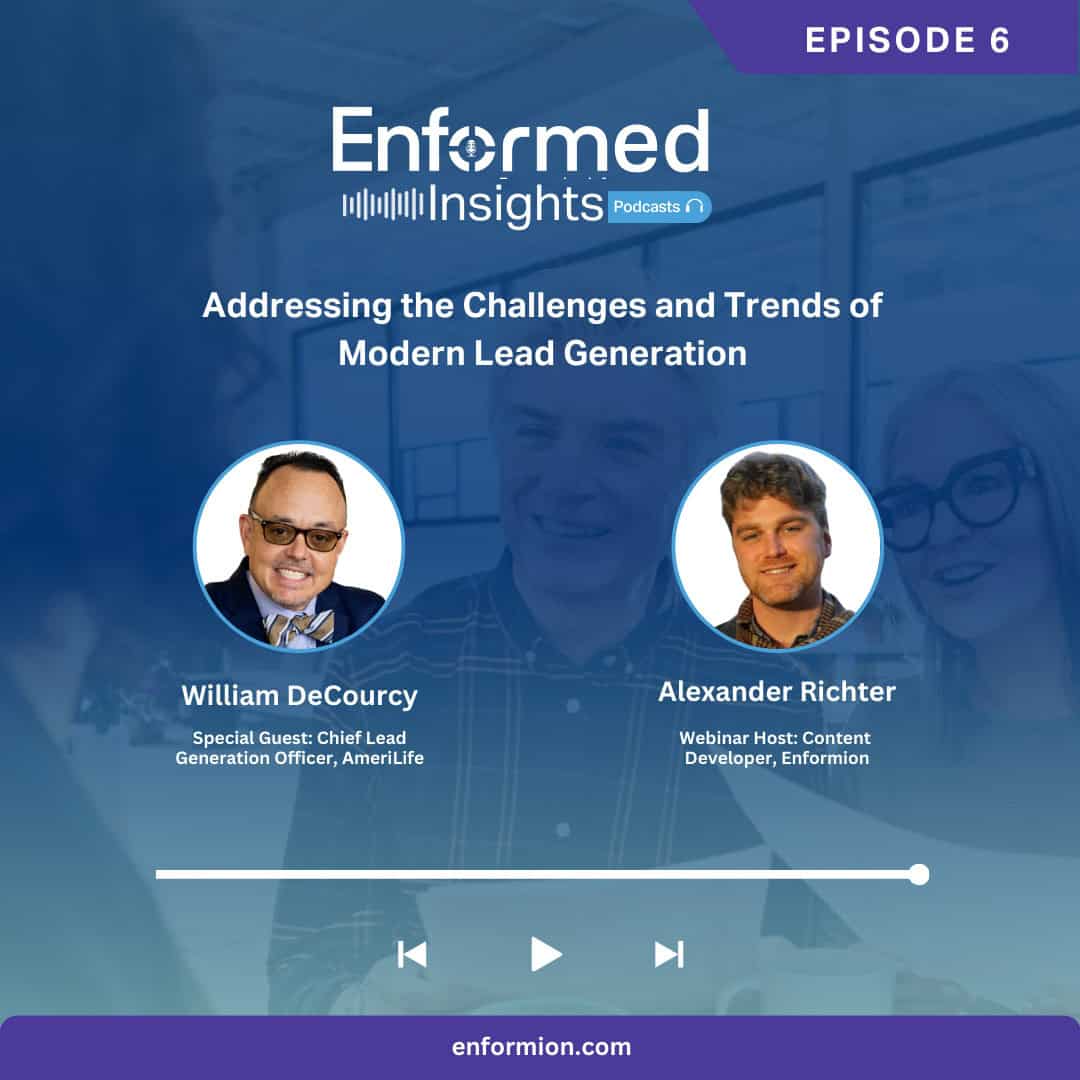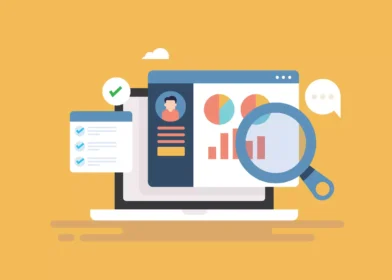Episode 6: Addressing the Challenges and Trends of Modern Lead Generation

Stream on these platforms:
Click play below to listen:
Join us for another episode of Enformed Insights, where we interview industry experts and gain personal insights into how they find success in their fields. In this episode we sit down with special guest, William DeCourcy, and dive into the importance of lead generation, compliance, and how innovative platforms like Lead Star are transforming the insurance marketing space. William also shares some personal insights on building and managing high-preforming teams with a focus on balancing compliance and productivity. Tune into this new episode as we highlight the future of performance marketing and its role in driving success for insurance agents and sales teams alike.
Key Discussion Points:
- The Role of Performance Marketing in Insurance
- Balancing Compliance with Lead Generation
- Human-Centered Design and Agent Feedback
- The Future of Performance Marketing in Insurance
Welcome to Enformed Insights, the official podcast of Enformion.com, and your guide to the world of public records and data analysis. Join our host, Alex Richer as he interviews industry experts and shares practical tips for navigating the future of digital information.
0:21
Hello, and welcome to another episode of the Enformed Insights podcast. I’m your host, Alex Richter, and today we’re joined by a very special guest, AmeriLife Chief Lead Generation Officer, Will Decourcy. Will, how are you doing today?
0:33
Will: I’m doing great, Alex. Thank you very much for inviting me to be on the podcast.
0:38
Alex: That’s great to hear, and thanks again for joining us. I want to start by diving into your background. Could you share a bit about your journey to AmeriLife?
0:43
Will: I’d be happy to. I’ve been with AmeriLife for the last four years, and before that, I held various positions in performance marketing, consumer research, and information technology. My background in IT grew out of my interest as a kid. I grew up when personal computers were first coming on the scene, and I was fortunate to have access to one in elementary school. It fascinated me—the potential these machines had to transform our lives personally and, later, professionally.
1:26
My interest in computers led to studying information technology, which then led to various IT roles just as the internet was emerging as a business tool. My first job out of college was as the Director of IT for a nonprofit in Michigan, where I’m originally from. Once you connect computers, you get curious about what they can do to enhance productivity, which led me into understanding user behavior—what people now call UX and UI. I went on to get my MBA at the University of Texas in Austin, focusing on consumer behavior and tech interactions.
2:26
From there, I joined Electronic Arts, where I worked at EA Sports as a lead researcher on their North American sports properties. My job was to understand what motivated people to play the games and what might stop them from playing. I would then relay that info to the production and programming teams so they could improve the games. Later, I shifted from research to performance marketing, turning insights into actions that drive positive business outcomes.
3:20
Alex: I’m sure a lot of people can relate to that journey, growing up with technology—I know I can! You mentioned performance marketing. What motivated you to enter this industry?
3:34
Will: It was about creating insights based on data—both qualitative and quantitative—and seeing those insights not put into action effectively. I wanted to be part of the team that took insights and turned them into actions that drove positive business outcomes. Once I had the expertise to gather information for the audience, moving into performance marketing felt like the next natural step.
4:14
Alex: What were some pivotal moments in your career that shaped your leadership style?
4:20
Will: Every challenging project has added a “brick” to my still-developing leadership style. Some pivotal moments include crises and opportunities and the mentors who helped me overcome those. One early example at AmeriLife involved our team growing rapidly in the direct-to-consumer insurance space. This required technology that worked seamlessly in the background so that our sales team could focus on servicing the customer, not worrying about the tech.
5:53
That experience taught me the difference between involved leadership and micromanagement. I believe in being involved, accessible, and aware without looking over everyone’s shoulder, which can disrupt their work. This balance—letting experts do their work while I step back—showed me the difference between ownership by involvement and ownership by micromanagement.
6:53
Alex: Let’s dive a bit more into your leadership style. What are some key leadership principles you hold, and how do you apply them at AmeriLife?
6:59
Will: My two key leadership principles are empowerment and accountability. I make sure my team knows they’re empowered to do their jobs and that I’m here to advise, coach, provide feedback, and clear blockers. But with empowerment comes accountability. I check in to make sure things are progressing as planned. This doesn’t mean the path is linear, but it does mean any necessary pivots are communicated to manage expectations.
8:02
One of the biggest blessings at AmeriLife is the individuals I work with every day. Our team formed just a few years ago, but it’s one of the highest-performing teams I’ve had the benefit of working with.
8:26
Alex: How do you approach building and managing high-performing teams?
8:34
Will: There’s a difference between building and managing teams. Building starts with hiring the right people. I believe in a challenging interview process to set up a smooth working process. I ask tough questions to clarify expectations, especially in an empowered work environment. Once hired, I empower team members from day one. I don’t throw them into the deep end, but I make it clear that the job begins from the start, with my support.
9:57
Alex: You’re currently working on overcoming a major operational challenge related to compliance. Could you tell us a bit about that?
10:02
Will: Sure. To give context, AmeriLife primarily sells Medicare Advantage insurance, which is affected by new CMS and FCC regulations impacting performance marketing and sales. This year, regulations are changing significantly. For example, the FCC wants to close the “lead generator loophole,” which has allowed unsolicited calls. Previously, a lead could allow companies to contact someone for various products, even if they didn’t realize it. Now, consent must be specific to each company.
12:00
For us, that means leads now need to indicate AmeriLife directly. We’ve prepared extensively for this change, so the flow of leads to our agents will be uninterrupted.
13:11
Alex: That’s a big challenge! Let’s shift to some industry insights. What advice would you give to someone starting in performance marketing today?
13:17
Will: My advice: Master AI. I’m a proponent of AI as a force multiplier. It allows us to do our jobs better without replacing us. AI isn’t going away, and the best thing you can do is dive in and master it—explore tools that automate workflows and become a skilled prompt engineer.
14:15
Alex: Given your stance on AI, I think I know the answer to this next question, but I’ll ask anyway—what are your predictions for the future of performance and affiliate marketing?
14:22
Will: More automation, definitely. For years, we’ve talked about big data, programmatic ad buying, and automated campaign optimization, but now it’s becoming real. The winners will be those willing to rethink their processes from the ground up to fully leverage AI, not just automate existing practices.
Certainly, here’s a cleaned-up transcript with timestamps preserved:
15:15
Alex: Received from actually observing human behavior, and that’s where the human factor will never be lost in this industry. What does performance optimization mean to you in today’s business landscape?
15:21
Will: Performance optimization to me is not a term that’s really varied much during my career, but the ability to get to that point of maximum optimization has. Performance optimization means exactly what you think it does—getting the greatest ROI on your performance marketing spends. The differentiation between then and now is that while you might have had a maximum multiple in the past of three, four, five-, or six-times ROI, now that’s just table stakes. Now, performance optimization means you can get very much closer to what would actually be your maximum return on investment.
15:38
Will: So the benchmark is changing. I don’t know that the definition is changing, but people who are performance marketing leaders are going to have to be accountable to a higher set of KPIs given all the technology out there. When somebody figures it out, there is a knock-on effect that will impact the business success of those that employ more efficient and optimized systems. If, in my case, agents have a total cost of acquisition of $150, and another agency does it for $125, given the number of policies many of these agencies do—that’s real money, real quick. So it’s those increasing efficiencies that are really changing.
15:44
Alex: Now, can you share a personal anecdote or story that highlights your passion for the industry?
16:09
Will: I can, and as I say that, I hesitate a little because this is a deeply personal story. Three years ago, there was a conference when I was just starting off in this business called Medication in Chicago. I was asked at the last minute to go in and speak on behalf of a real industry leader who people were looking forward to seeing. I was asked to speak as a substitute because they weren’t able to make it. I was brand new in this business and all the experience I had in it was tied to the tech build I described at the beginning of this conversation. So, I hadn’t really gotten into the nitty-gritty of the distribution organization and actual sales process. I was going to speak to agents and agency owners and felt—well, the best way to put it is I felt a bit of imposter syndrome.
16:26
Will: I don’t think I’ve ever told anyone this besides my wife, but I nearly canceled the trip because I was so reluctant to step into that role, feeling unprepared. My wife said, “You can skip it, or you can go with the attitude that everyone has a first time doing something difficult. Embrace the industry, learn as much as you can, take your slings and arrows, trip, and then decide you’ll go back next year and do it even better.” She said, “Knowing you, in a few years, you’ll be recognized at these events.” Two years later, at Medicareions, a group of peers asked me to run for President of the Insurance Marketing Coalition. And I knew I’d found my spot. All credit to my beautiful wife; she was right.
16:39
Alex: Wow, that’s an incredible story, and I’m sure there are plenty of people listening who can relate. Thank you again for sharing that.
16:48
Alex: Focusing a bit more on current trends in the industry, what are the biggest challenges and opportunities right now facing the performance marketing industry?
17:06
Will: The top three are compliance, compliance, and compliance. If you’re not generating leads in a compliant fashion, you’re subjecting your company to potential liability—possibly hundreds of thousands, if not millions, in fines. You’re also putting your brand at risk of a reputational hit. So, it’s all about compliance. You don’t need to be a lawyer to do this job, but you need to know the regulations.
17:22
Will: Yes, it can be tedious. These regulations are often hundreds of pages long, but you have to sift through, find the relevant parts, and establish compliance-first policies and procedures. Without that, you’re putting not just your livelihood, but the livelihood of everyone who works for your company, at risk.
17:42
Alex: That completely makes sense—compliance is a huge factor today. Now, I wanted to focus a bit more on AmeriLife as a company and your strategy as a whole. What are AmeriLife’s key differentiators in the competitive performance and affiliate marketing software landscape?
17:52
Will: We think of AmeriLife as a comprehensive distribution platform for agents and agencies, and our key differentiator, as cliche as it sounds, is our culture. Our culture is laser-focused on our mission: helping seniors live longer, healthier lives. That’s what we do every day, and everyone is driven by it.
18:02
Will: We’re designing systems with a human-centered design philosophy, making it easy for agents and agencies to fulfill this mission. We integrate our systems to provide insights into what’s happening in their book of business, enabling them to be there for their beneficiaries and ensure those people are in the best plans possible. This is the best company I’ve ever worked for, and everything—technology, communications, products—centers on empowering people to live healthier, more fulfilled lives.
18:20
Alex: Speaking of the technology AmeriLife is utilizing, how does the company plan to stay ahead of emerging technologies and trends in this industry?
18:26
Will: I can’t share specific details on platforms and technologies, but I’ll say this: we’re currently developing Leader 2.0, a new lead platform under AmeriLife with a set of leads for agents and agencies. We’re not ready to announce all the features yet, but everything we’re doing is informed by direct consumer research. In this case, our consumers are the agents using the platform.
18:46
Will: We’ve asked them questions like, “How likely are you to recommend this to another licensed agent? How satisfied are you with this program?” We’ve received valuable feedback, helping shape the next version. As a part of our culture, AmeriLife listens to its consumers and designs technology solutions based on that feedback.
19:00
Alex: Can you share some insights on AmeriLife’s recent growth and future expansion plans?
19:06
Will: AmeriLife is aggressively growing, both organically and inorganically. We’re competitive in acquiring businesses that align with our culture and growth mentality. We’ve acquired about 90 companies on both health and wealth sides. These companies continue to operate as they did, backed by the support of the AmeriLife parent organization.
19:19
Will: This fuels our organic growth as well, doing more with more together. Our motto, “together as one,” guides us in empowering agencies to grow their business, yielding stellar financial and growth metrics over my four years with the company.

Ready To Get Started?
Contact us today to request a demo or to get in touch with one of our Data Solution Experts
Talk With Us

